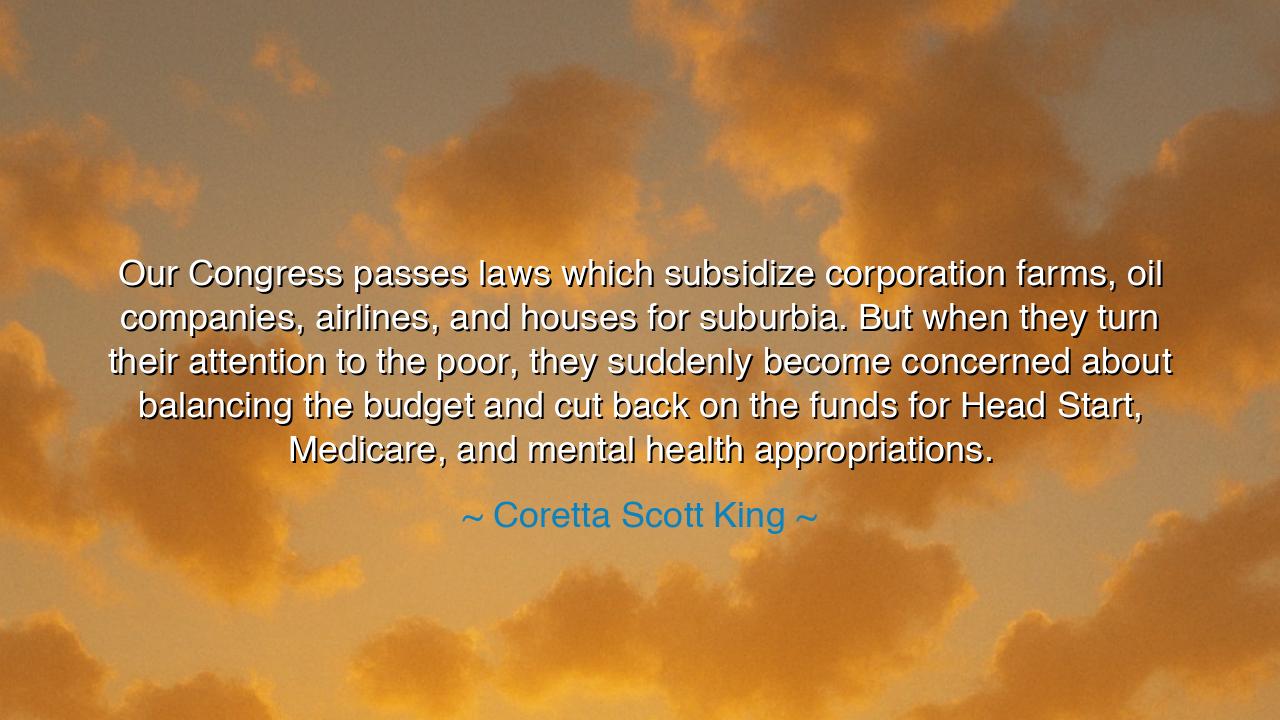
Our Congress passes laws which subsidize corporation farms, oil
Our Congress passes laws which subsidize corporation farms, oil companies, airlines, and houses for suburbia. But when they turn their attention to the poor, they suddenly become concerned about balancing the budget and cut back on the funds for Head Start, Medicare, and mental health appropriations.






“Our Congress passes laws which subsidize corporation farms, oil companies, airlines, and houses for suburbia. But when they turn their attention to the poor, they suddenly become concerned about balancing the budget and cut back on the funds for Head Start, Medicare, and mental health appropriations.” — thus spoke Coretta Scott King, the torchbearer of justice, widow of the martyred Dr. Martin Luther King Jr., and warrior for the voiceless. Her words are not merely a critique of policy, but a cry from the soul of righteousness — a mirror held up to the hypocrisy of power. In her wisdom, she exposes a truth as old as civilization: that injustice often hides behind the mask of reason, and that those who claim poverty of resources often possess poverty of compassion.
In this quote, Coretta Scott King speaks to the imbalance of a society that claims to value equality yet builds its systems upon inequality. She points to the ease with which the mighty are nourished — the corporate farms, the oil companies, the airlines, the sprawling homes of suburbia — all receiving the blessings of public wealth. Yet when the poor, the sick, and the vulnerable reach out their hands, the nation’s guardians suddenly speak of restraint, of deficits, of the need to “balance the budget.” This is not a fiscal truth, she implies, but a moral failing. For a government that finds riches for the powerful and austerity for the powerless has forgotten its soul.
The roots of her message reach back into the ancient moral order. The prophets of old — Isaiah, Amos, Micah — thundered against the same blindness of the rich, who “trample the needy and bring the poor of the land to ruin.” The philosopher Plato warned that any society that allows wealth to dominate virtue will rot from within. And even in the modern age, Coretta Scott King saw this same corruption in the heart of America: a nation that could build weapons beyond imagination and subsidize industries of luxury, yet hesitate to heal the wounds of poverty, hunger, and mental despair. Her words remind us that the sickness of inequality is not economic, but spiritual — the disease of a heart that loves power more than people.
Consider the tale of Rome, that mighty empire which once ruled the known world. In its glory, it built monuments, armies, and trade routes that spanned continents. Yet even as its coffers overflowed, its citizens starved. The rich grew fat while the poor were forgotten. Bread was replaced by spectacle, compassion by control. The same senators who funded wars and circuses cried poverty when the hungry cried for bread. And so Rome fell — not from invasion alone, but from moral decay. In this same spirit, Coretta’s warning rings across centuries: that a nation which turns its back on the poor while feeding the powerful prepares its own destruction.
Her mention of Head Start, Medicare, and mental health appropriations is not incidental. These are the instruments of healing — programs that nurture the mind, the body, and the soul of the nation. To cut them is to sever the roots of the tree while watering its leaves. Head Start shapes young minds, offering children born into hardship a chance at dignity and growth. Medicare protects the elders who once carried the burdens of progress. And mental health care tends to the invisible wounds that too many bear in silence. When these are diminished in the name of economy, the nation bleeds from within, even as its balance sheets appear sound.
In her truth, Coretta calls not only for justice in government, but for justice in the heart. She challenges each person to see that compassion is not weakness, and that charity is not a burden but a sacred duty. The wealth of a nation must serve the wholeness of its people, not the greed of its few. When leaders forget this, it is the task of the people to remind them — to rise, to speak, to demand that moral balance replace fiscal excuses. True strength, she teaches, is not found in the power of corporations, but in the protection of children, the care of the elderly, and the healing of the broken.
The lesson, then, is clear: measure a nation not by its riches, but by its righteousness. If there is abundance for the privileged, there must be compassion for the poor. If there is gold for war, there must be bread for peace. And if ever the halls of power grow deaf to suffering, then the people must become the conscience of the land — as Coretta Scott King did, standing tall in the shadow of injustice, yet radiant with hope.
So, my children of the present age, remember her teaching. Let your voices rise for those who cannot speak. Hold your leaders accountable not for how much they spend, but for whom they choose to serve. For a nation that funds greed over grace is doomed to fall, but one that defends the dignity of every human soul will endure. Let justice, then, be your measure; let compassion be your currency. For as Coretta Scott King reminds us, only when we choose the welfare of the many over the comfort of the few will the soul of a nation be truly whole.






AAdministratorAdministrator
Welcome, honored guests. Please leave a comment, we will respond soon